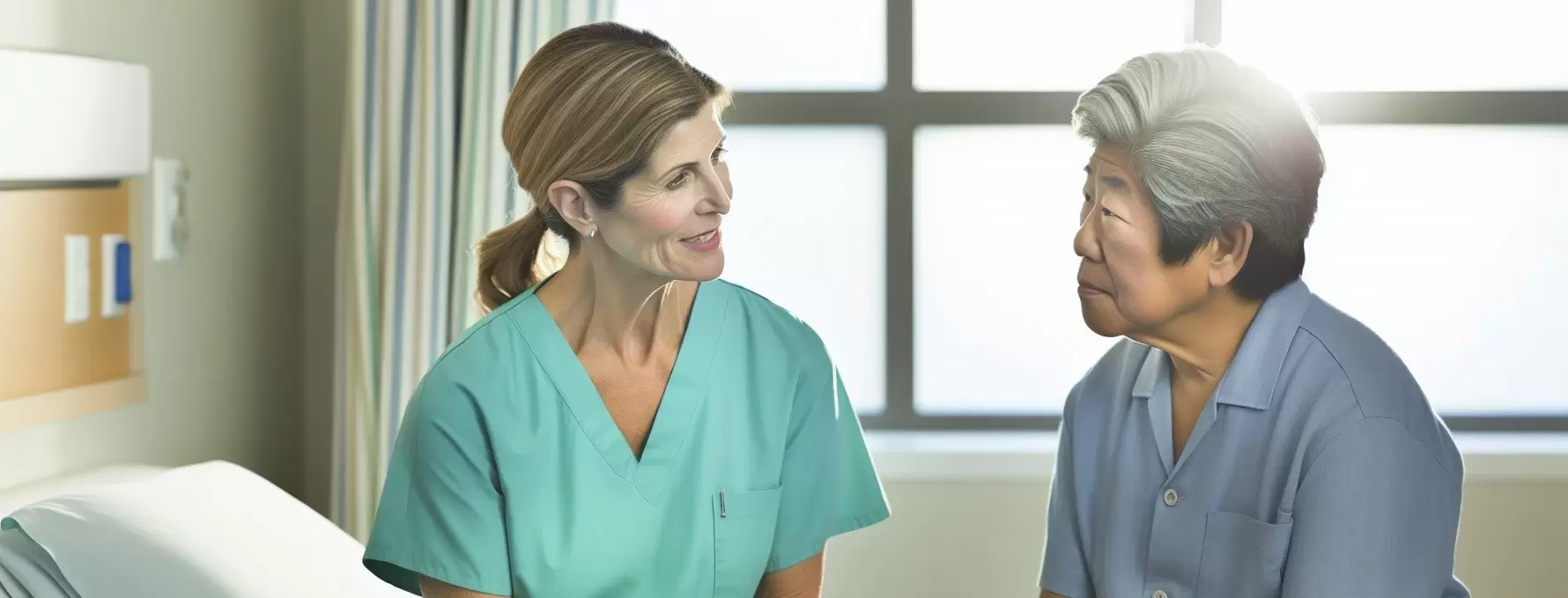Hire a Private Nurse: Your Guide to Personalized In-Home Care
When you’re looking to hire a private nurse, the goal is to find a licensed, compassionate professional who will provide high-quality in-home care tailored to your specific medical needs.
Navigating the process of hiring licensed practical nurses can be overwhelming, from understanding the types of services available to assessing your needs, researching options, and making informed decisions about care.
This guide is brought to you by the recruiting team at The Celebrity Personal Assistant Network. We will walk you through each step, ensuring you have the knowledge to choose the best home health aides for a loved one, understand the costs involved, and establish a smooth-working relationship.
Navigating the process of hiring licensed practical nurses can be overwhelming, from understanding the types of services available to assessing your needs, researching options, and making informed decisions about care.
This guide is brought to you by the recruiting team at The Celebrity Personal Assistant Network. We will walk you through each step, ensuring you have the knowledge to choose the best home health aides for a loved one, understand the costs involved, and establish a smooth-working relationship.
Key Takeaways
- Private duty nursing provides personalized, one-on-one medical and personal care within a patient’s home, facilitating recovery and daily living routines in a familiar environment.
- Hiring a private nurse involves assessing care requirements, exploring local agencies and online resources, and considering the qualifications, education, special training, and experience of the potential caregiver.
- Costs for private nursing care can be significant but can vary by region and patient needs, with payment options including long-term care insurance, Medicaid, and other financial assistance programs.
Understanding Private Duty Nursing
The world of private duty nursing opens up a realm of personalized care unlike any other. A private duty nurse is a highly skilled caregiver who delivers one-on-one care to a single person, frequently within the patient’s residence. This personalized care offers not only medical assistance but also facilitates a more restorative recovery, enabling patients to participate in their daily routines in the familiar environment of their own home.
A range of services can be provided by private duty nurses, including:
Private nursing services offer the much-needed aid for family caregivers, providing invaluable support physically and emotionally. They ensure peace of mind for both patients and their families. A private registered nurse may even work with an affluent family's personal assistant to provide light housekeeping and homemaking services in the estate.
A range of services can be provided by private duty nurses, including:
- Wellness checks
- Medication management
- Wound care
- Post-surgery recovery assistance
- Daily personal care for older adults
- Medication management for family members
Private nursing services offer the much-needed aid for family caregivers, providing invaluable support physically and emotionally. They ensure peace of mind for both patients and their families. A private registered nurse may even work with an affluent family's personal assistant to provide light housekeeping and homemaking services in the estate.
The Role of Private Duty Nurses
Many patients consider private duty nurses as their lifeline, providing essential services that range from medical to personal care. Through keen observation, they can detect potential medical problems before they escalate and keep track of vital signs, ensuring the patient’s health and well-being. These highly skilled nurses -- also called caregivers or companions -- are equipped to administer medication, conduct wound care, and manage symptoms, providing comprehensive home care.
Beyond medical care, private duty nurses offer:
In essence, private duty nurses are not just healthcare providers, but also personal assistants, promoting both physical health and emotional well-being.
Beyond medical care, private duty nurses offer:
- Companionship, particularly to patients facing physical or mental limitations
- One-on-one care, enabling patients to maintain their daily living routines while receiving professional health care at home, similar to the support provided by home health aides
- Support as confidants, promoting both physical health and emotional well-being
In essence, private duty nurses are not just healthcare providers, but also personal assistants, promoting both physical health and emotional well-being.
Types of Private Duty Nurses
It is important to remember that there are various categories of nurses when considering health care at home, each with different levels of education and duties. These include Certified Nursing Assistants (CNAs), Licensed Practical Nurses (LPNs), and Registered Nurses (RNs).
CNAs are responsible for observing and reporting changes in the patient, taking vital signs, and administering some treatments. LPNs, on the other hand, assess and evaluate clients’ needs, provide in-home medical assistance, and implement specialized care plans. RNs have the most comprehensive training, allowing them to handle complex patient care and decision-making responsibilities. Understanding these distinctions can help ensure you choose the right nurse for private employers.
CNAs are responsible for observing and reporting changes in the patient, taking vital signs, and administering some treatments. LPNs, on the other hand, assess and evaluate clients’ needs, provide in-home medical assistance, and implement specialized care plans. RNs have the most comprehensive training, allowing them to handle complex patient care and decision-making responsibilities. Understanding these distinctions can help ensure you choose the right nurse for private employers.
Hiring a Private Nurse: Where to Begin
The initial process of hiring skilled nurses may seem daunting, but with the right recruiter, this process can be streamlined and straightforward. The first step is to assess your individual requirements. This involves understanding the type of assistance required, the total hours of care needed, and the nurse’s level of education, experience, and training that would be appropriate for your specific situation.
Along with assessing your needs, exploring options is a vital step in the hiring process of licensed practical nurses. The recruiters at The Celebrity Personal Assistant Network specialize in household staffing and have been working with the high-net-worth for more than 15 years.
Along with assessing your needs, exploring options is a vital step in the hiring process of licensed practical nurses. The recruiters at The Celebrity Personal Assistant Network specialize in household staffing and have been working with the high-net-worth for more than 15 years.
Assessing Your Needs
Having a clear understanding of your needs is crucial before starting your search for LPNs. This involves determining the level of care required, which can be ascertained by assessing the individual’s capability to carry out Activities of Daily Living (ADLs) and evaluating their mobility.
In addition to these functional assessments, it’s important to consider specific medical needs. A thorough nursing assessment can help determine these needs, which may encompass activities of daily living (ADLs) and other skilled nursing needs.
Furthermore, personal preferences and cultural compatibility should also be considered as they play a vital role in fostering therapeutic relationships and making the patient feel comfortable and understood. At our staffing agency, we consider hard skills, soft skills, and personality traits in candidates.
In addition to these functional assessments, it’s important to consider specific medical needs. A thorough nursing assessment can help determine these needs, which may encompass activities of daily living (ADLs) and other skilled nursing needs.
Furthermore, personal preferences and cultural compatibility should also be considered as they play a vital role in fostering therapeutic relationships and making the patient feel comfortable and understood. At our staffing agency, we consider hard skills, soft skills, and personality traits in candidates.
Why Use a Domestic Staffing Agency
Our household staffing firm was established by a subject-matter expert in domestic staffing. Brian Daniel has worked with celebrities and high-net-worth families for over 30 years, so he understands their unique needs.
Our agency covers the following:
Additionally, household staffing professionals can provide insights into the qualities to look for in skilled nurses, such as trustworthiness, compassion, empathy, respectfulness, technical competence, and strong communication skills.
Our agency covers the following:
- Run a background check on nurse practitioners
- Confirm liability insurance
- Review recommendation letters
- NDAs: Non-disclosure agreements
- Confirm credentials to administer medications
- Verify education and former employment
- Run personality tests to ensure a match
Additionally, household staffing professionals can provide insights into the qualities to look for in skilled nurses, such as trustworthiness, compassion, empathy, respectfulness, technical competence, and strong communication skills.
Key Qualifications & Skills to Look for in a Private Nurse
As you set out to find the right private nurse for your needs, it’s crucial to consider their qualifications and skills. This includes:
A nurse’s qualifications and skills not only determine their capability to provide care but also contribute to their ability to connect with patients on a personal level.
It’s also important to note that private nurses should possess strong communication and organizational skills, excellent problem-solving abilities, and heightened sensitivity to the patient's needs. These qualities enable them to provide effective care and foster a comforting environment for the patient.
- Education
- Licensure
- Relevant experience
- Specialized training
A nurse’s qualifications and skills not only determine their capability to provide care but also contribute to their ability to connect with patients on a personal level.
It’s also important to note that private nurses should possess strong communication and organizational skills, excellent problem-solving abilities, and heightened sensitivity to the patient's needs. These qualities enable them to provide effective care and foster a comforting environment for the patient.
Education & Licensure
The journey to becoming a licensed practical nurse begins with formal education and licensure. Depending on their role, private duty nurses are required to be licensed, with options including Registered Nurses (RNs), Licensed Vocational Nurses (LVNs), and Certified Nursing Assistants (CNAs).
To become a CNA, individuals must have at least a high school diploma or equivalent. They also need to complete state-approved nursing assistant training and pass the state’s CNA certification exam. LPNs, on the other hand, must possess a minimum of an associate degree in nursing or a diploma in practical nursing from an accredited educational program.
To become a Registered Nurse (RN), one must acquire a two-year or four-year degree from an accredited university and successfully pass the National Council Licensure Examination.
To become a CNA, individuals must have at least a high school diploma or equivalent. They also need to complete state-approved nursing assistant training and pass the state’s CNA certification exam. LPNs, on the other hand, must possess a minimum of an associate degree in nursing or a diploma in practical nursing from an accredited educational program.
To become a Registered Nurse (RN), one must acquire a two-year or four-year degree from an accredited university and successfully pass the National Council Licensure Examination.
Relevant Experience & Specialized Training
Beyond education and licensure, relevant experience and specialized training are crucial in preparing private nurses to effectively handle complex patient needs and ensure the delivery of outstanding care. The right training is particularly important when it comes to caring for patients with specific medical conditions. Certifications in the following areas are particularly significant:
These certifications are especially important when providing care for patients with conditions related to geriatrics, mental health, oncology, pediatrics, cardiac care, and other specialized fields. Additionally, experience in a highly regarded medical center can further bolster a private nurse’s ability to provide private services.
- Critical care nursing
- Medical-surgical
- Trauma care
- Pediatric nursing
These certifications are especially important when providing care for patients with conditions related to geriatrics, mental health, oncology, pediatrics, cardiac care, and other specialized fields. Additionally, experience in a highly regarded medical center can further bolster a private nurse’s ability to provide private services.
Cost & Payment Options for Private Duty Nursing Care
The cost and payment options should be considered, despite the invaluable benefits of private duty nursing. The expenses associated with engaging the services of licensed nurses are impacted by the type of assistance required, the total hours of care, and the nurse’s level of education, experience, and training.
Fortunately, there are multiple payment options and financial assistance programs available to help cover the costs of private nursing care. This includes long-term care insurance, and in some cases, Medicaid may offer payment for care depending on specific limited-need and income-based criteria.
Fortunately, there are multiple payment options and financial assistance programs available to help cover the costs of private nursing care. This includes long-term care insurance, and in some cases, Medicaid may offer payment for care depending on specific limited-need and income-based criteria.
Average Cost of Private Duty Nursing Care
Having a ballpark estimate is beneficial when considering the cost of private nursing. The typical cost of part-time private duty nursing care is approximately $25 per hour.
For full-time care, the annual cost for continuous 24-hour shifts is approximately $50,000 to $60,000 per nurse. However, it’s important to note that these costs may vary based on various factors such as:
It's also important to note that private nursing services for high-net-worth families and celebrities can be substantially more. Candidates that that work for billionaires, for example, can command salaries in the $150,000 a year range.
For full-time care, the annual cost for continuous 24-hour shifts is approximately $50,000 to $60,000 per nurse. However, it’s important to note that these costs may vary based on various factors such as:
- the cost of living in the region
- average wages
- the level of care needed
- the qualifications and experience of the caregiver
- the location of residence
It's also important to note that private nursing services for high-net-worth families and celebrities can be substantially more. Candidates that that work for billionaires, for example, can command salaries in the $150,000 a year range.
Financial Assistance & Insurance Coverage
Despite the significant investment of private duty nursing costs, there are several financial assistance and insurance coverage options available to help alleviate the burden. Long-term care insurance, for instance, can cover the expenses associated with private nursing, while private health insurance may also provide some coverage.
Medicare, however, does not provide coverage for private duty nursing. Medicaid may offer payment for care depending on specific limited-need and income-based criteria. Additionally, financial assistance programs like Medicaid programs, Program of All-Inclusive Care for the Elderly (PACE), and non-medical home care assistance programs can also help cover costs.
Medicare, however, does not provide coverage for private duty nursing. Medicaid may offer payment for care depending on specific limited-need and income-based criteria. Additionally, financial assistance programs like Medicaid programs, Program of All-Inclusive Care for the Elderly (PACE), and non-medical home care assistance programs can also help cover costs.
Finding the Right Match: Interviewing & Selecting a Private Nurse
The process of finding the right private nurse involves:
It’s important to consider more than just qualifications and cost when choosing LPNs. It’s crucial to assess factors such as effective communication, empathy, and compassion.
An ideal licensed vocational nurse not only meets the medical needs of the patient but also establishes an emotional connection, creating a comforting environment for care and recovery.
- Conducting interviews with potential candidates
- Evaluating candidates based on their qualifications and experience
- Assessing compatibility with the patient and family
It’s important to consider more than just qualifications and cost when choosing LPNs. It’s crucial to assess factors such as effective communication, empathy, and compassion.
An ideal licensed vocational nurse not only meets the medical needs of the patient but also establishes an emotional connection, creating a comforting environment for care and recovery.
Preparing for Interviews
Having a list of questions ready is important when preparing for interviews with potential private nurses. These inquiries should cover:
Furthermore, it’s crucial to address the candidate’s professional experience in nursing, their motivation for pursuing this career path, and their broader healthcare background during the interview. This allows you to gauge their suitability and preparedness for the role. Any candidate that is highly trained is going to especially be desirable to high-net-worth family members.
- Their level of experience
- Specific experience in pediatric nursing or home care
- Their perspective on the key qualities that a successful certified nursing assistant should possess
Furthermore, it’s crucial to address the candidate’s professional experience in nursing, their motivation for pursuing this career path, and their broader healthcare background during the interview. This allows you to gauge their suitability and preparedness for the role. Any candidate that is highly trained is going to especially be desirable to high-net-worth family members.
Evaluating Candidates
After the completion of the interview process, it’s time for candidate evaluation. This involves considering their qualifications, experience working for affluent families, and how well they connect with the patient.
It’s also important to consider the candidate’s capacity in the following areas:
Evaluating a candidate’s capacity to manage emergencies and stress is crucial in ensuring they can handle the demands of the job.
It’s also important to consider the candidate’s capacity in the following areas:
- Establishing emotional connections with the patient and their family
- Resilience and ability to cope with stress and mental health challenges
Evaluating a candidate’s capacity to manage emergencies and stress is crucial in ensuring they can handle the demands of the job.
Ensuring a Smooth Transition to Private Duty Nursing Care
Ensuring a smooth transition to private duty nursing care is the next step once the right skilled nurse is selected. This involves effective communication with the patient’s medical team and establishing a comprehensive care plan.
Involving the patient and their families in the transition process is also crucial. This fosters active involvement in care, enhances the patient’s overall experience, and attains improved health results.
Involving the patient and their families in the transition process is also crucial. This fosters active involvement in care, enhances the patient’s overall experience, and attains improved health results.
Communicating with Your Loved One's Medical Team
Effective communication with the patient’s medical team is paramount for a smooth transition to private duty nursing services. This involves delivering precise, clear, and consistent information about the patient’s condition, treatment regimen, and post-discharge follow-up.
Private duty nurses can foster this communication by:
Overcoming communication obstacles such as insufficient information, misinterpretation, and accountability can enhance the transition to private nursing care.
Private duty nurses can foster this communication by:
- Promoting respectful communication
- Encouraging patients to articulate their fears and concerns
- Fostering open communication between the medical team and patients and their families
Overcoming communication obstacles such as insufficient information, misinterpretation, and accountability can enhance the transition to private nursing care.
Establishing a Care Plan
Establishing a comprehensive care plan for the patient is a crucial part of the transition to private duty nursing care. This involves:
The medical plan should be reviewed and potentially adjusted at regular intervals, usually every six months or more frequently in the event of changes in the client’s medical condition. It’s also important to ensure that the patient and their loved ones are involved in the decision-making process when modifying the plan.
- A thorough assessment of the patient’s medical history, and medications
- Formulating nursing diagnoses
- Setting patient goals
- Designing nursing interventions
The medical plan should be reviewed and potentially adjusted at regular intervals, usually every six months or more frequently in the event of changes in the client’s medical condition. It’s also important to ensure that the patient and their loved ones are involved in the decision-making process when modifying the plan.
Maintaining Quality Care & Ongoing Support
Maintaining care and providing ongoing support is key after transitioning to private duty nursing services. This involves:
Regular check-ins and updates with home health aides not only keep the family informed about the patient’s progress but also provide an opportunity to discuss any concerns or changes in the patient’s condition.
Furthermore, adjusting the medical plan as needed allows for changes in the patient’s condition or needs, ensuring optimal care and support.
- Regular check-ins and updates
- Adjusting the care plan as needed
- Ensuring the patient’s needs are being met
- Addressing any concerns
Regular check-ins and updates with home health aides not only keep the family informed about the patient’s progress but also provide an opportunity to discuss any concerns or changes in the patient’s condition.
Furthermore, adjusting the medical plan as needed allows for changes in the patient’s condition or needs, ensuring optimal care and support.
Regular Check-Ins & Updates
To monitor the patient’s progress and address any concerns, regular check-ins and updates with the skilled nurse are essential. These check-ins offer personalized and one-on-one medical care, continuous monitoring for safety and well-being, and customized care with tailored treatment plans.
The frequency of regular check-ins with nurse practitioners may vary based on the individual’s needs and condition. It is advisable to seek guidance from the nurse or healthcare provider to ascertain the suitable frequency of check-ins. Regular updates from the nurse can also:
A registered nurse will have the same duties she would in a hospital, even if it's in a private setting like an estate working for a high-net-worth family.
The frequency of regular check-ins with nurse practitioners may vary based on the individual’s needs and condition. It is advisable to seek guidance from the nurse or healthcare provider to ascertain the suitable frequency of check-ins. Regular updates from the nurse can also:
- Enhance documentation processes
- Increase access to care
- Improve care quality and coordination for chronic conditions
- Monitor patients more closely to detect potential medical issues.
A registered nurse will have the same duties she would in a hospital, even if it's in a private setting like an estate working for a high-net-worth family.
Adjusting the Care Plan as Needed
Adjustments to the care plan may be necessary as the patient’s condition changes or new needs arise. These adjustments can include changing the frequency of care, introducing new treatments or therapies, or modifying the patient’s medication regimen.
The medical plan should be reviewed and potentially adjusted at regular intervals, usually every six months or more frequently in the event of changes in the client’s medical condition. When adjustments are needed, it’s crucial to communicate these changes directly to the private care providers, ensuring that the patient’s personal space and preferences are respected during these discussions.
The medical plan should be reviewed and potentially adjusted at regular intervals, usually every six months or more frequently in the event of changes in the client’s medical condition. When adjustments are needed, it’s crucial to communicate these changes directly to the private care providers, ensuring that the patient’s personal space and preferences are respected during these discussions.
A Final Word on Hiring Private RNs, LVNs & CNAs for Your Home
Navigating the world of private duty nursing may seem daunting at first, but with the right information and guidance, you can find the right nurse to provide personalized home care for you or your loved one. From understanding what private medical care is, to hiring a nurse, and ensuring a smooth transition to private duty nursing care, we’ve covered everything you need to know. Whether you need part-time help or require round-the-clock care, private nursing offers a level of personalized care that ensures peace of mind and promotes recovery and well-being in the comfort of home.
Frequently Asked Questions
Here are some additional insights about the process of employing private medical professionals in our household.
How do I hire the right private duty nurses for my estate?
When hiring a private duty nurse, connect with staffing agencies like The Celebrity Personal Assistant Network, craft a clear job description, showcase your organization, establish an interview procedure, use social media, and ask your household staff for insight.
Look for nurses with adaptability, commitment to growth, attention to detail, and familiarity with specific types of high-net-worth patients to meet your household needs. Ask thoughtful questions about education, professional experience, and nursing philosophy to identify strong candidates.
Look for nurses with adaptability, commitment to growth, attention to detail, and familiarity with specific types of high-net-worth patients to meet your household needs. Ask thoughtful questions about education, professional experience, and nursing philosophy to identify strong candidates.
Are registry nurses different from registered nurses?
Yes, they are different. In California, for example, a registry nurse refers to a private duty, self-employed nurse who is assigned to provide patient care under the direction or supervision of a registered physician or surgeon. This allows for specialized care in various healthcare settings.
What is a nurse concierge business?
A nurse concierge business involves registered nurses providing customized healthcare services to patients in a private setting, working independently outside the traditional healthcare system, and offering personalized medical care tailored to meet high-profile clients' needs.
What does a private duty nurse do?
Private duty nurses provide one-on-one care to a single person in the patient's home, offering personal care and companionship.
How much does private duty nursing care cost?
Private duty nursing services typically costs around $25 per hour for part-time care and $50,000 to $60,000 annually for full-time care. These costs can vary based on location and specific care needs. When working in the private service industry for celebrities or high-net-worth families, these costs can double or even triple depending on experience.
How much does a registered nurse who works for a billionaire make?
In-home medical providers that work for billionaires or an affluent family member can command amazing salaries in the $250,000 a year range. The provide ongoing care that other healthcare providers can't do in senior centers or a nursing home.









